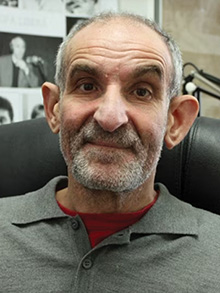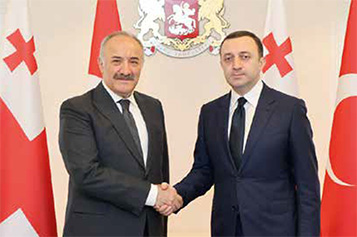
EU-Azerbaijan Relations Are Important for Both Sides  By Vasif HUSEYNOV, PhD, Head of Department, AIR Center, Adjunct Lecturer, ADA and Khazar Universities, Baku By Vasif HUSEYNOV, PhD, Head of Department, AIR Center, Adjunct Lecturer, ADA and Khazar Universities, Baku
EU-Azerbaijan relations are important for both sides, and the Brussels format of the Armenia-Azerbaijani peace talks, are likewise important to reach negotiated solutions over the remaining unresolved questions between Baku and Yerevan. The reactivation of the Brussels format and the revitalization of the constructive role of the EU in the South Caucasus should happen sooner rather than later. A balanced approach by the EU and its leading member states vis-à-vis the countries of the region is of utmost necessity towards this end.
On 25 October, Toivo Klaar, the EU Special Representative for the South Caucasus, announced that the scheduled meeting between Armenian Prime Minister Nikol Pashinyan and Azerbaijani President Ilham Aliyev with the mediation of the European Council President Charles Michel in Brussels [known as the Brussels format of the Armenia-Azerbaijan peace talks] had been postponed due to scheduling problems. Previously, another EU-brokered summit between these two leaders from the South Caucasus, originally planned to take place on the sidelines of the European Political Community gathering on 5 October, was cancelled by the Azerbaijani side.
READ MORE
- EGF Editor |
Published on EGF: 13.11.2023
| External Relations
-
How Russian Migration Fuels Armenia’s IT Sector Growth  By Benyamin POGHOSYAN, PhD, Chairman, Center for Political and Economic Strategic Studies By Benyamin POGHOSYAN, PhD, Chairman, Center for Political and Economic Strategic Studies
The Russian invasion of Ukraine has led to a significant influx of Russian IT specialists into Armenia, boosting the sector and contributing to the country's economic recovery.
The growth of IT has become a synonym for Armenia’s development in the last decades. Given that the country has had a rather strong position in the IT sector since the collapse of the Soviet Union, it appears to be natural to observe the industry flourishing. In the 2000s, the primary agents of change were the branches of multinational companies, such as Synopsys Armenia and others. In recent years, the focus has shifted towards establishing a vibrant and thriving start-up ecosystem. Not even the economic slowdown in 2014-2016, the political upheavals of 2018, the Covid-19 Pandemic, and the 2020 war in Nagorno Karabakh did stop the growth of the IT sector in Armenia.
READ MORE
- EGF Editor |
Published on EGF: 13.11.2023
| Markets
-
The efficiency of organization of measures to ensure public safety based on the principle of “Serving human interests”  Umidjon Qodirov,
Independent researcher of the Academy of the MIA of the Republic of Uzbekistan, cand.of law sciences, associate professor Umidjon Qodirov,
Independent researcher of the Academy of the MIA of the Republic of Uzbekistan, cand.of law sciences, associate professor
Special attention is being paid to ensuring a peaceful and tranquil life of the population and to forming a culture of law-abidingness and public safety as part of the large-scale reforms implemented in our country. In particular, completely new mechanisms and procedures for organizing work in the direction of public safety on the basis of the principle of “Serving the interests of the people” are introduced, and mutual purposeful cooperation of state bodies with public structures is established.
READ MORE
- EGF Editor |
Published on EGF: 06.11.2023
| External Relations
-
Azerbaijan Advocates for Regional Solutions to Regional Problems in the South Caucasus  By Vasif HUSEYNOV, PhD, Head of Department, AIR Center, Adjunct Lecturer, ADA and Khazar Universities, Baku By Vasif HUSEYNOV, PhD, Head of Department, AIR Center, Adjunct Lecturer, ADA and Khazar Universities, Baku
On October 4, Azerbaijani President Ilham Aliyev cancelled a meeting with Armenian Prime Minister Nikol Pashinyan, European Council President Charles Michel, French President Emmanuel Macron, and German Chancellor Olaf Scholz that was meant to take place at the European Political Community summit in Granada, Spain, on October 5. The Granada summit was a long-awaited occasion in the context of the Armenian-Azerbaijani peace talks, particularly against the backdrop of the collapse of the separatist regime in Azerbaijan’s Karabakh region. Baku has instead voiced its support for more regionally centric negotiating formats for solving disputes in the South Caucasus.
READ MORE
- EGF Editor |
Published on EGF: 04.11.2023
| External Relations
-
Azerbaijan’s New “Shopping List”  By Benyamin POGHOSYAN, PhD, Chairman, Center for Political and Economic Strategic Studies By Benyamin POGHOSYAN, PhD, Chairman, Center for Political and Economic Strategic Studies
Since the launch of the first Artsakh (Nagorno-Karabakh) war in the 1990s, the region’s status has been at the core of the conflict. This issue was the primary focus of negotiations and different settlement options put forward by the OSCE Minsk Group—package solution, phased approach, Common State, Key West, Kazan document, Lavrov plan—which all tried to find a mutually acceptable solution for the status of Artsakh. At the end of the day, Azerbaijan decided to solve this issue by military force. Azerbaijan probably came to this decision in the early 2000s, hoping it could get more by deploying military force than by any negotiated solutions. Azerbaijan was cautiously waiting for the geopolitical window of opportunity, which appeared in 2020 as a combination of the COVID-19 pandemic, elections in the U.S. and growing misperceptions of Armenia-Russia relations after the 2018 Velvet Revolution.
READ MORE
- EGF Editor |
Published on EGF: 04.11.2023
| Security
-
Instead of Dissolving, Artsakh Should Have a Government in Exile  By Yeghia TASHJIAN, Beirut-based regional analyst and researcher, columnist, "The Armenian Weekly” By Yeghia TASHJIAN, Beirut-based regional analyst and researcher, columnist, "The Armenian Weekly”
On September 28, 2023, Artsakh President Samvel Shahramanyan issued a decree announcing that, in the wake of Azerbaijan’s assault on Artsakh, the authorities of Artsakh agreed to dissolve their government by the end of the year and be fully integrated into Azerbaijan.
The decree aimed: to dissolve all state institutions and organizations under their departmental subordination until January 1, 2024, and the Republic of Nagorno-Karabakh (Artsakh) shall cease to exist; the population of Nagorno-Karabakh, including those outside the Republic, after the entry into force of this decree, shall familiarize themselves with the conditions of reintegration presented by the Republic of Azerbaijan in order to make an independent and individual decision on the possibility of staying in Nagorno-Karabakh.
This was perceived as the end of the Artsakh dream. However, this announcement came under the threat of force and ethnic cleansing, placing its legality in question. Moreover, most of the political and military leaders of Artsakh have been arrested by Azerbaijan, amid the passive stance of the Russian peacekeepers and the Armenian government.
READ MORE
- EGF Editor |
Published on EGF: 04.11.2023
| External Relations
-
How the Military Escalation in Gaza Could Impact the South Caucasus  By Yeghia TASHJIAN, Beirut-based regional analyst and researcher, columnist, "The Armenian Weekly” By Yeghia TASHJIAN, Beirut-based regional analyst and researcher, columnist, "The Armenian Weekly”
On October 7, 2023, Palestinian Islamist militant group Hamas launched operation “Al-Aqsa Flood,” aiming to destroy the Israeli army positions near Gaza and capture as many soldiers as possible, in order to exchange them with the almost 7,000 Palestinians detained in Israeli prisons. The operation created a shockwave in Israeli society, killing more than 1,000 soldiers and civilians. As a result, Israelis started indiscriminately bombing Gaza, killing civilians and threatening ethnic cleansing through a land invasion. The danger that the escalation will turn into a regional conflict involving Iran and Hezbollah is high. Such a step would surely have devastating consequences for the region and a domino effect beyond the Middle East. If Israel, which is Azerbaijan’s military partner and Iran’s regional enemy, was involved in a war of attrition in Gaza or a regional escalation, it would become isolated from the events in the South Caucasus.
READ MORE
- EGF Editor |
Published on EGF: 26.10.2023
| Security
-
Georgia is Losing, and Losing Badly  Interview by “Georgia Today” with Eugene KOGAN, Tbilisi-based defence and security expert Interview by “Georgia Today” with Eugene KOGAN, Tbilisi-based defence and security expert
Georgia is not ready to defend itself if Moscow decides to invade again. And this is a very big weakness, one which should have been solved years ago and remains unresolved to this day…In Georgia, they don’t bother to ask themselves difficult questions…it’s something Georgian politicians seem to be averse to – Eugene Kogan, a researcher at the Vienna Institute of International Politics, an expert on defence and security issues in Eastern Europe and the Middle East, who has been living in Georgia for the past 10 years, told RFE/RL’s Georgian Service. We spoke to him about the role of Georgia in the region, territorial integrity, Karabakh, and the new war in the Middle East. We started with the Israel-Hamas conflict. READ MORE
- EGF Editor |
Published on EGF: 26.10.2023
| Security
-
Armenia Should Avoid Replacing Foreign Policy Diversification with an Anti-Russian Strategy  By Benyamin POGHOSYAN, PhD, Chairman, Center for Political and Economic Strategic Studies By Benyamin POGHOSYAN, PhD, Chairman, Center for Political and Economic Strategic Studies
Since the 2020 Nagorno Karabakh war, diversification has probably been the most-used term in discussions about the future of Armenian foreign policy. It should be noted that Armenia has sought to pursue a diversified foreign policy since the early years of independence. In parallel with establishing a strategic alliance with Russia, Armenia has launched a pragmatic partnership with the EU and NATO. Armenia signed its first IPAP (Individual Partnership Action Plan) with NATO in 2005. NATO was actively involved in the defence reforms in Armenia accelerated after 2008, including defence education and strategic defence review. Armenia joined the EU Eastern partnership initiative in 2009. It failed to conclude the Association Agreement with Deep and Comprehensive Free Trade Area. Instead, it signed the Comprehensive and Enhanced Partnership Agreement in 2017, now serving as the solid base for Armenia–EU relations.
READ MORE
- EGF Editor |
Published on EGF: 26.10.2023
| External Relations
-
Georgian–Turkish Relations and their Impact on Russia  By Eugene KOGAN, Tbilisi-based defence and security expert By Eugene KOGAN, Tbilisi-based defence and security expert
In a nutshell, friendly relations between Georgia and Turkey are not a deterrent against potential Russian aggression against Georgia. Russia can always impose a blockade of Georgia’s Black Sea coast by using its naval assets in Sevastopol, Crimea and Ochamchire in occupied Abkhazia, thereby effectively ‘strangling’ the nascent Georgian Coast Guard. However, despite being somewhat politically marginalised by the West, Turkey remains a crucial partner for Georgia.
Georgian–Turkish relations are in essence cordial but not equal. Georgia’s Prime Minister, Irakli Garibashvili, is viewed as a junior partner in the relationship with President Recep Tayyip Erdoğan. For Georgia, Turkey represents an important partner in the volatile South Caucasus region. At the same time, enjoying friendly relations with Georgia as a transit country for oil, gas and cargo trains from Azerbaijan to Turkey, known as the Baku-Tbilisi-Kars (BTK) railway, is important for Turkey. Moreover, cargo transferred by road from Russia and Azerbaijan via Georgia to Turkey is a basic necessity. Bilateral relations are mainly focused on the economy and, occasionally, the Turkish military donates or sells military equipment to the Georgian Defence Forces (GDF). READ MORE
- EGF Editor |
Published on EGF: 19.10.2023
| External Relations
-
|
|
